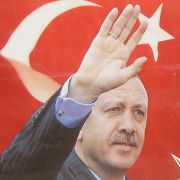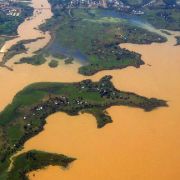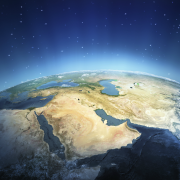Sisi as Sisyphus: Egypt's Economic Emergency
 Will Egypt's newly elected president become a new Sisyphus, the legendary king of Corinth, who was condemned eternally to roll a heavy rock up a hill in Hades only to have it roll down again as it reached the top?
Will Egypt's newly elected president become a new Sisyphus, the legendary king of Corinth, who was condemned eternally to roll a heavy rock up a hill in Hades only to have it roll down again as it reached the top?
Abdel Fattah al-Sisi was officially confirmed as Egypt's next president, after the country's electoral commission announced that he had won 96 percent of the votes cast in the presidential election held at the end of May 2014. Officials claimed that slightly less than 47.5 percent of Egypt's 53 million eligible voters participated. These figures are an important indication of Sisi's legitimacy (or the limits of it), something that will be crucial given the tasks he faces.
The state of the economy was one of the most important factors in the crisis that has plagued Egypt since the fall of Hosni Mubarak in February 2011. It played a major part in the removal of his successor, Mohammed Morsi and the fall of Hazem Abdel Aziz Al Beblawi who was interim prime minister from July 2013 to March 2014.
Egypt's economic problems have worsened as a result of the political chaos of recent years. If they are not tackled then political unrest is likely, and Sisi has said that he would resign in the face of opposition. In addition, Egypt is experiencing severe security problems as the army and police face violent opposition from the Muslim Brotherhood. Furthermore, the demographic clock keeps ticking at what may be an accelerating rate.
In May 2014, the Central Bank of Egypt reported that the latest economic growth rates were slower than that of the population, an indication that per capita income was falling. Real gross domestic product (GDP) picked up slightly in the second quarter of 2013/2014 (the Egyptian fiscal year begins in July) growing by 1.4 percent compared to the 1.04 percent recorded in the quarter ending September 2013. However, this brought the annual growth rate in the first half of 2013/2014 to only 1.2 percent compared to the growth rate of 2.1 percent recorded in 2012/2013. Economic activity was weak due to modest growth rates in most of the key sectors: manufacturing and construction, in addition to the contraction in the tourism and petroleum sectors. Investment levels remained low given the heightened uncertainty that markets have faced since early 2011 and weak credit growth to the private sector. Downside risks that surround the global recovery, the challenges facing the Euro area, and weak growth in emerging markets could pose risks to domestic GDP in the future.
If the macro-economic picture looks bleak then the fiscal one looks even worse. Since 2011, Egypt's fiscal deficit and public debt have soared, reaching 14 percent and over 100 percent of GDP, respectively. Massive domestic borrowing to finance the growing deficit has increased the banking sector's exposure to government debt and crowded out private investment. Since the beginning of 2011, Egypt's foreign reserves have fallen by 50 percent to $17.5 billion.
In May, the government-owned Al Ahram newspaper reported that the situation is bad: "Egypt's financial crisis is hindering payments for food commodities as banks and traders say some of the funding problems which first surfaced early last year are re-emerging."
Subsidized food is considered vital to limit or prevent social unrest among millions who could not afford free market prices. As a result, Egypt has become the world's largest wheat buyer, importing 16.6 million tonnes of wheat in 2013-2014, 20 percent more than the previous year. While food commodities are top priorities, traders have experienced delays with letters of credit issued for goods they supply to state buyers, including the General Authority of Supply Commodities (GASC).The Egyptian government spends around a quarter of its budget on food and fuel subsidies. The food subsidies cover sugar, rice, and vegetable oil, as well as wheat.
Traders and bankers said tight foreign currency reserves, combined with the Central Bank's cautious approach to allocating funds, slowed payment procedures for food bought by the state. This forced the central bank to take drastic measures to direct its available funds to strategic commodities: food-related items and medicine. Some traders said that the elections had slowed down administrative processes thus causing delays. Bankers and traders said that although there were delays, there had not been any defaults.
President Sisi and the military will have no choice but to confront Egypt’s economic crisis. The most critical question they will face is whether and how to continue the reforms begun in the 1970s under President Anwar Sadat and continued under Hosni Mubarak, which were meant to encourage competition, free trade, foreign direct investment, and modernization in sectors such as banking, finance, real estate, telecommunications, transportation, and healthcare. These reforms brought economic growth but did not offer enough jobs for the growing youth cohort. They were based in part on crony capitalism that benefited the elite but pushed much of the middle class into relative poverty. It was the demonstrations in Tahrir Square, largely by the young urban lower middle classes, that brought down Mubarak.
The military has been skeptical of economic liberalization because it threatened its influence in Egypt’s economy. Some have suggested that the generals removed Mubarak because they did not want his son Gamal—a proponent of economic reform but also a symbol of crony capitalism—to succeed his father or expand his economic empire at their expense. Another explanation was that as a result of the huge demonstrations, the continuation of Mubarak's rule threatened political stability and the economy in which the army has a huge stake.
The army's interest is to maintain its position as the ultimate arbiter in the political process and to protect its assets that are estimated at up to 40 percent of the economy. The military economy includes the numerous factories and production facilities that are controlled by the Ministries of Defense and Military Production. These also include companies affiliated with the Arab Organization for Industrialization and National Services Production Organization. While these are state-owned entities, their accounts are not subject to financial oversight by the government's Central Auditing Organization.
The military produces a huge array of civilian goods and services. It is also involved in large infrastructure projects. Piped gas is supplied by the military as are foodstuffs, cement, and gasoline. Another source of the military's wealth is its landholding, which is increasingly being converted into gated communities and resorts. The military has other advantages: it does not pay taxes nor does it have to deal with a bureaucracy that strangles the private sector.
In 1979, following the peace agreement with Israel, the military – which then numbered about 900,000 – had to be downsized. The need to find alternative employment for large numbers of officers resulted in many of them being absorbed by the military industries. It also resulted in the military entering civilian production. Some 250,000 officers were retired during Mubarak’s 30-year presidency and to retain their loyalty and to offer future prospects for those still in service, the army's economic empire was developed. Egypt's standing army other security forces now number 850,000. Maintaining this huge force is one of the key ways in which the government keeps unemployment down. Maintaining the military and its assets is Sisi's major concern.
In 2012, the Islamist President Mohammed Morsi initially favored economic reform in order to stimulate growth and secure $4.8 billion in aid from the International Monetary Fund (IMF) as well as more than $6 billion in related assistance from the EU and US. IMF assistance was conditioned on Egypt taking painful measures, such as reducing energy subsidies, trimming the state bureaucracy, instituting a sales tax and more progressive income tax, as well as investing in infrastructure. But, facing strong opposition to the IMF deal and the foreign influence that would accompany it, Morsi rejected the agreement.
On a number of occasions since January 2011, Egypt attempted to negotiate an agreement with the IMF to stabilize the economy, only to suspend talks before they come to fruition, mostly for fear of what such a program would do to the fragile socio-political balance in the country. Aid from the Gulf received after the removal of Morsi in mid-2013 has provided short-term financial relief.
Approximately 50 percent of the population lives near or below the poverty line of $2 income a day. Government policies that for decades provided social protection for the poor—through subsidies for food and public utilities, free education and health services, and low cost housing—have all proven to be costly and inefficient and have gradually been undermined. Furthermore, relatively rapid economic growth rates during the last decade of Mubarak’s rule, at an average of 6 percent a year, not only failed to trickle down and lift people out of poverty, but were in fact associated with a rise in poverty. Mubarak's policies increased the poor’s dependence on government assistance for survival and further squeezed the state budget.
High levels of youth unemployment are another serious challenge for the new president. The overall unemployment rate is 13.4 percent; nearly 70 percent of the unemployed are between 15 and 29 years, and over 80 percent are educated. Each year, over 800,000 young Egyptians enter the job market for the first time, thus adding to the severity of the problem. In 2012, over 39 percent of 20 to 24 year-olds were unemployed and 28 percent of 18 to 29 years were unemployed. Unemployment among male college graduates was 38 percent, compared to 24 percent for mid-qualified males, and 8 percent for illiterate males. Among females, 57 percent of college graduates were unemployed, 54 percent of mid-qualified women, and 1 percent of illiterate women. Youth of both sexes were estimated to make up 52 percent of the work force, with 47 percent of youth working full time jobs, and 36 percent working part time.
With an already bloated public sector that employs 30 percent of the labor force but no longer guarantees automatic employment for college graduates – as it did from the 1960s to 1990s – and a weak private sector that operates in a very difficult business environment, the informal sector is the only option left for most Egyptian youth seeking employment. Pay in that sector is low and there are no work benefits or career prospects.
Egypt is also struggling to contain a population explosion that has surged in the past three years, exacerbating many of the social tensions that contributed to the 2011 uprising. The number of births in 2012 was 560,000 or 40 percent higher than in 2010 and the largest two-year increase since records began. The rise keeps Egypt on course to overtake Russia and Japan by 2050, when the UN predicts it will have a population of 122 million.
The rising population is a social time bomb, which, if not tackled, will exhaust Egypt's depleted resources, worsen conditions in the labor market, and contribute to yet more social and political pressure. As 60 percent of Egyptians are under age thirty, a bulging population will further reduce the limited opportunities for young people.
The growing population not only adds to costs but it drains the country's natural resources. Egypt already faces severe water, energy, and wheat shortages – and lacks the foreign currency reserves needed to fund more than a few months of imports. Population control policies, which were relatively successful during the 1980s and 1990s, began to weaken during the last years of Hosni Mubarak's government – and were largely ignored in the chaos that followed 2011. And after the Morsi was elected in 2012, his administration publicly declared that population control was not a government concern as it was seen as an attempt to disrupt traditional family life.
Sisi faces a truly Sisyphean task dealing with the combined legacies of Mubarak and Morsi. The consequences of failure will threaten his regimes as they did his predecessors.






